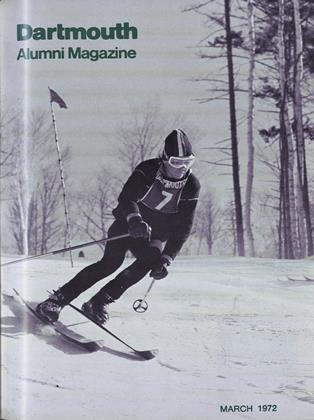A Study of the Past and PresentStatus of the American Indians. ByWilcomb E. Washburn '4B. New York:Charles Scribner's Sons, 1971. 280 pp.$7.95.
Chairman of the Department of American Studies at the Smithsonian Institution, Wilcomb Washburn in recent years has published a number of first-rate essays and articles dealing with the legal and moral perceptions and rationalizations of Europeans in their relations with the American Indians. In Red Man's Land-White Man'slaw he impressively brings these threads together.
Although an able legal scholar, Washburn does not deal with law as a series of statutes and decisions operating in a vacuum. Rather his understanding of legal development, much in the tradition of James Willard Hurst, takes into account the social, economic, and ethical pressures under which any legal system must function. His conclusions in regard to United States legal structures as they have related to the Native American peoples do not offer much room for self- congratulation: "That the solemn treaties of the United States proved ineffective first against the lawless white frontiersmen of the time and later against the forgetful successor governments of the United States is less a commentary on law than it is on honor."
From the papal bull Inter Caetera in 1493 which divided the newly "discovered" western world between Spain and Portugal, through the termination policies of the 1950's and 1960's, Mr. Washburn's narrative and analysis relate remarkably similar themes. Spanish colonials deemed the Indian "a material resource to be exploited and as a spiritual object to be saved," assumptions that many, I fear, share even today. These concepts, supported by the idea of the inferiority of Indian culture, permitted the development of a body of law which proved a willing accessory to the exploitation of Indian land and culture.
In this age of the "rediscovery" of the American Indian (a development which must cause a good bit of concern among the Indian people, who have yet to recover from our initial discovery), Wilcomb Washburn's book should be must reading for concerned Americans. Dartmouth men might find it Specially enlightening—and troubling. I suspect that those who read it will do less "wah-hoo-wahing" and will write fewer degrading slogans about "squaws" and drunken Indians.
Dartmouth Assistant Professor of History,Mr. Wright in his course, History of theAmerican West, concentrates on the continuing influence of the frontier experience,American Indians, and the dynamics of manand natural resources.
 View Full Issue
View Full Issue
More From This Issue
-
 Feature
FeatureFinancing Higher Education
March 1972 By John G. Kemeny -
 Feature
Feature"Fraternities Are in Trouble"
March 1972 By DAVID WRIGHT '72 -
 Feature
FeaturePilobolus: Energetic Dance-Theater
March 1972 By ANDREW W. CASSEL '72 -
 Feature
FeatureDartmouth Institute Plans First Session
March 1972 By M.R. -
 Article
ArticleFaculty
March 1972 By ROBERT B. GRAHAM '40 -
 Class Notes
Class Notes1950
March 1972 By JACQUES HARLOW, ERIC T. MILLER









